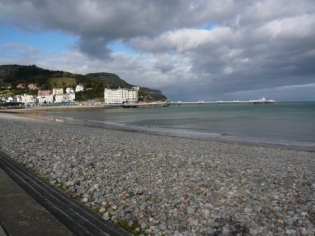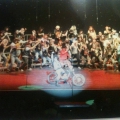Add a comment
LABBS in Llandudno
‹-- PreviousNext --› October by the sea: why they invented the phrase 'bright and breezy'The weekend saw the Ladies Association of British Barbershop Singers head to North Wales for their annual Convention. One of the things it is easy to take for granted when it works, but which should not go unremarked, is the efficiency and competence of the event's organisation.
October by the sea: why they invented the phrase 'bright and breezy'The weekend saw the Ladies Association of British Barbershop Singers head to North Wales for their annual Convention. One of the things it is easy to take for granted when it works, but which should not go unremarked, is the efficiency and competence of the event's organisation.
Saturday was dominated by a mammoth chorus contest, with the first singers on stage at 10 am and the last scheduled for 6.25 pm, so it is more than a little impressive that the whole thing only lost three minutes over the course of the day. The Convention Team and stage crew need to feel very pleased with themselves about this, as it makes the experience so much better for competitors (who can therefore pace their preparation accurately) and audience (who can therefore be sure they get to see the groups they are particularly interested in).
The general consensus after each contest was that the standards felt good across the board, and this impression is borne out by the score sheets. All sixteen quartets scored over 60, as did the top 24 choruses. When I first joined LABBS in 1996, the score to qualify to compete at the national convention was 50 - this year, every single competing chorus exceeded that score.
One major development this year was the transformation of the Gold Medal Quartets' contest from a traditional set of two barbershop songs to a 12-minute show package that included at least one contest-grade song.
This was a fabulous event, giving the audience a lift with the novelty value at the end of a longish afternoon of quartet semi-finals. It was also an exciting project for the quartets involved, Finesse, NoteOrious and The Mix. They are all experienced performers who have done many show spots in their time, but the competitive dimension really helped them raise their game.
One of the challenges past champions talk about is how to keep their focus and discipline high without the performance goal of contest, which is why the organisation has been exploring ways to offer them contest opportunities for a few years. But this change in format not only motivated a high level of preparation, but also stretched them creatively and expressively. They all raised their game artistically as well as performatively.
What was exciting about this as an audience member* was how different the performances were from one another. Each quartet brought creative ideas and musical qualities to the performances that were unique to them. They didn't merely play to their strengths, they also developed and strengthened their distinctive qualities as quartets through the medium of the show package. And not just in the non-barbershop bits - they were more vividly characterised in the traditional contest material too.
Now I find this very interesting. It is clearly a wonderfully positive response to a new challenge, which gave them growth opportunities they might not otherwise have found in quite the same way.
But, the thing is this: all the Sweet Adelines reading this will be saying, 'But we've been doing this at International for years, it's nothing new.' Which is of course the case - indeed Finesse will be aiming to give their package another airing in Hawaii next month. But I wouldn't say that the show-package final you see there has this quality of making the different quartets more distinctively themselves; if anything, it has the effect of encouraging a sub-genre of barbershop show-package that is in some ways as constrained in its conventions as people complain the traditional two-song contest set is.
It was reflecting on this that made me realise how strongly the contest system itself encourages artistic standardisation. People usually point the finger at the Music Category as restricting available repertoire when they are worried about lack of artistic breadth. But the standardisation of SAI show packages show us that simply allowing a free choice of songs and the opportunities for spoken links etc itself doesn't necessarily breed expressive range or distinctive performance personalities.
The perennial problem that contest structures deal with is of course the conflation of standards (as in excellence) and standards (as in normative ways of doing things). Barbershop competition is undoubtedly successful in achieving the first, but at the cost of producing the second. This is both through the direct route of those making the assessments training people to focus on the things those assessments reward (aka training to the test), and through the indirect route of people observing which behaviours are rewarded (or appear to be awarded) and reproducing them.
The latter is of course how you get the copycat performance and all its unintended consequences. But it's also how you maintain a performance tradition. It is a powerful tool for socialising skills as well as for refining them to the point of idiosyncrasy.
So, why was it that the LABBS show-package contest brought us such freshness and variety? My current guess is that it is because there is as yet no history within the organisation to draw upon, so they competitors were both forced and free to be innovative. (Haydn made a similar point about isolation I seem to recall - being stuck out in the country estate at Esterhazy forced him to think for himself rather than following musical fashion.)
So, it is hard to predict how this might develop. Will an annual contest for LABBS Gold Medal Quartets produce an artistic reversion to the mean through the feedback loop of contest? Or have the three quartets who competed this year established the identity of the contest as being about originality and distinctiveness?
And if you think I am trying to drop a hint to future competitors as to which way I hope it might go....
* I was on the judging panel, but these comments aren't about the task of scoring competitors, they are the kinds of things anybody who was there might be saying.











